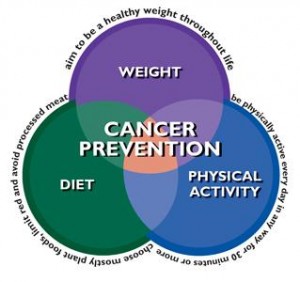
Cancer prevention is a concern of almost everyone. Here are some tips to help reduce your risk according to the Mayo Clinic. You can take charge by eating a healthy diet and get screenings regularly.
Reports can be conflicting about cancer prevention. The specific tips recommended in one study can be advised against in another one. The facts about cancer prevention are still evolving but it is well accepted that developing cancer is affected by the lifestyle choices you make. If you are concerned about how to do everything you can to prevent cancer there are some simple changes you can make to your daily life.
- Don’t use tobacco of any kind. This raises your chances of getting cancer exponentially. Smoking for example has been linked to many types of cancer including lung, cervix, bladder and kidney and chewing tobacco is linked to oral cavity and pancreatic cancer. Even exposure to secondhand smoke if you don’t smoke yourself can increase the risk of lung cancer. So, avoid tobacco or stop using it altogether, this is one of the most decision about your health you will make, and a very important cancer preventer. To get help talk to your doctor, there are products out there to help you quit.
- Eat a healthy diet, getting healthy choices at the store and mealtimes can’t guarantee you won’t get cancer, it may reduce the risk. Eat plenty of fresh fruits and vegetables, diet should be focused on foods from plant sources like fruits and veggies as well as beans and whole grains. Limit fat, choose lean meats. Diets high in fat with more calories may increase risk of obesity and can increase the risk of cancer. Limit alcohol. Many types of cancer risk, breast, colon, lung, kidney and liver increase with the amount of alcohol and the length you drink it can up your risk.
- Being active physically and keeping your weight in a healthy range might lower the risk of certain types of cancer like breast, prostate, lung, kidney and colon cancer. Being physically active helps by controlling your weight and may lower the risk of cancer. Adults participating in any amount of activity will gain health benefits but for big benefits you have to get at least 150 minutes a week of moderate aerobic activity or 75 minutes of vigorous. A good goal would be at least thirty minutes a day or more if you can. If can be broken up into ten minute increments.
- The most common type of cancer is skin cancer and is one of the most preventable. Avoid sun between 10 a.m. and 4 p.m.; the sun’s rays are the strongest at those times. Stay in the shade when you go outside and wear sunglasses and a wide brimmed hat. Cover exposed areas with loose fitting clothes that are bright or dark colors; they reflect ultraviolet radiation better than pastels or bleached cotton. Don’t use tanning beds or sunlamps which are just as damaging as the sun.
- Get your immunizations. This can prevent cancer caused by certain viral infections. Hepatitis B can raise the risk of liver cancer. The vaccine is recommended for health care or public safety workers as well as sexually active adults not in a monogamous relationship, individuals with sexually transmitted disease, IV drug users and men who have sex with men.
- Don’t take chances with your health. Those with HIV and HPV have a higher risk of certain types of cancer. Practice safe sex limiting your number of partners and always use a condom. Don’t share needles which can lead to HIV, Hepatitis B and C and can increase the risk of liver cancer.
- Get your regular checkups at the doctor. Self-exams and screenings can help prevent skin, colon, prostate, breast and cervical cancer and can increase the chance of detecting them early when the treatment will most likely be more successful. You can ask your doctor about the best cancer screening schedule for you.
The reward of taking cancer prevention into your own hands will last a lifetime!
Resources:
http://www.mayoclinic.com/health/cancer-prevention/CA00024
http://preventcancer.aicr.org/site/News2?page=NewsArticle&id=12968&news_iv_ctrl=0&abbr=pr_

Comments are closed.